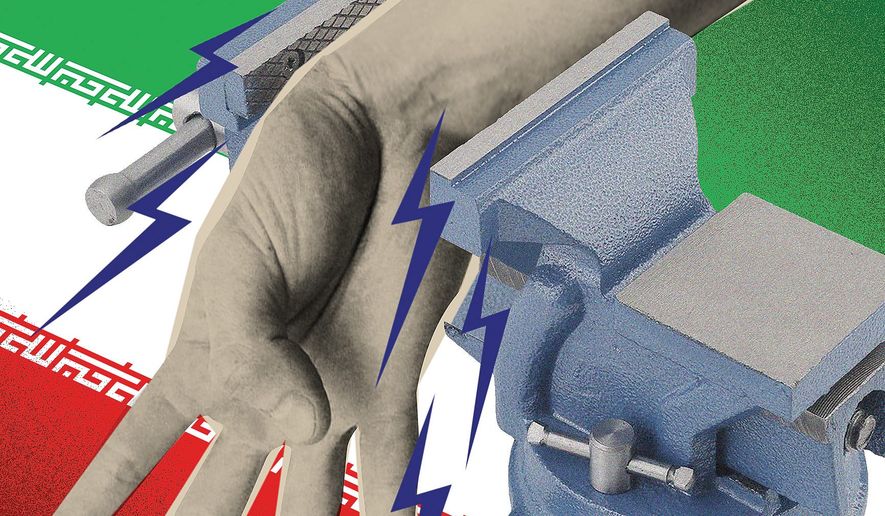OPINION:
Defenders of the nuclear deal with the Islamic Republic of Iran predicted that President Trump’s sanctions would have little impact unless our European friends joined in. They were dead wrong.
That same crowd is now in a frenzy over Mr. Trump deploying military assets to the Middle East to deter or, if necessary, punish attacks on Americans by the Islamic Revolutionary Guard Corps or its many proxies.
They have been claiming — including in paid advertisements — that Mr. Trump is leading a “march to war.”
What’s really happening is less dramatic but more intriguing: Iran’s rulers are feeling intense pain from Mr. Trump’s “maximum pressure” campaign, and they are no longer sure they can wait for what they hope will be a more conciliatory occupant of the White House in 2021.
So they’ve been floating the possibility of negotiating with the Trump administration. Secretary of State Mike Pompeo is soon to visit Switzerland, where the fluctuating price of chocolate will not be the main topic of discussion. Swiss diplomats represent the United States in Iran.
Mohammad Javad Zarif, the Islamic Republic’s foreign minister, has proven himself a skilled negotiator. When he sat down at the table with Secretary of State John Kerry, it was like Doc Holliday playing poker with a greenhorn in Dodge City.
The pot Mr. Zarif raked in was the Iran deal, formally known as the Joint Comprehensive Plan of Action, which promised Iran’s rulers sunset clauses — patient pathways to nuclear weapons as key restrictions disappear. What if the Islamic Republic remains, as it’s long been, the world’s leading state sponsor of terrorism? It won’t matter.
Mr. Zarif now wants to play a few hands against Mr. Pompeo, but doesn’t want to seem too eager. So he routinely insults Mr. Trump — he recently called him a “terrorist” — and demands that the president show “respect” for Iran’s ruling mullahs before any new talks begin.
What he really wants is for the United States to ease restrictions on Iranian oil exports, and lift other sanctions as well — akin to what President Obama did in 2013 after the conclusion of an interim agreement. Following that, Mr. Zarif made no serious concessions. Mr. Kerry made one after another.
I’m hopeful — not confident — that President Trump and Mr. Pompeo won’t repeat their predecessors’ mistakes by rewarding the mullahs for nothing more than sending Mr. Zarif to filibuster and dine in Europe’s finest restaurants. Does that close the door on a new round of diplomacy?
Not necessarily. Mr. Zarif’s negotiating position may not be his fallback position. He may, after a while, agree to attend talks without preconditions. If not, an alternative occurs to me.
Imagine if the Germans, the French and the British, the so-called E3, were to say to Mr. Zarif: “Look, we’ve not just shown you respect — we’ve bent over backward for you. So talk to us. You claim you don’t have a nuclear weapons program, don’t want one, and — oh yes — threaten to ratchet up your nonexistent nuclear weapons program if you don’t get some cash in your pocket soon. So let’s hammer out some new agreements. We can take those to President Trump and see if, in exchange, we can’t get his Gucci loafers off your throat.”
Such agreements would have to include eliminating the sunset clauses, ending the development of missiles capable of carrying nuclear warheads, allowing international inspectors to seriously verify that illicit research is not being secretly conducted, and prohibiting the production of fissile material for nuclear warheads.
Will that be enough to satisfy Mr. Trump? I’d argue it shouldn’t be. Not at this point in the 40-year-old conflict with the revolutionary theocrats.
A year ago, Mr. Pompeo announced 12 conditions that Iran’s rulers must meet if they want all sanctions lifted and, perhaps, a restoration of diplomatic relations and economic support. Regime sympathizers in the media and think tanks have pronounced those conditions “impossible” and tantamount to “surrender.”
Brian Hook, the U.S. special representative for Iran, has repeatedly asked: Is it really impossible for the theocrats to stop sponsoring terrorists, holding hostages, bankrolling mass-murdering dictators and threatening their neighbors? And were they to cease torturing and murdering ethnic and sexual minorities, would that really be waving a white flag?
The Islamic Republic’s enablers are, in effect, arguing that America and Europe should accept such practices as the new normal. Defining deviancy down is never a good idea. At present — with the rulers of North Korea, China, Russia and a list of non-state jihadi groups watching — it would be particularly ill-advised.
In Japan on Monday, President Trump said he was not “looking for regime change” in Iran. “I just want to make that clear. We are looking for no nuclear weapons.”
Yes, but he should insist that the regime change its conduct in line with his administration’s eminently reasonable 12 conditions. To fail to do so would repeat another of President Obama’s most egregious errors: Implicitly licensing the regime to continue a range of nefarious activities, including sponsoring terrorism in the Middle East, Europe, Latin America and the United States.
Is it possible for such change to come about through a new and improved round of diplomacy? The odds are low but, if that does happen, it will not be because Iran’s rulers are enthusiastic about the benefits detente would bring.
It will be because they have been crippled by American sanctions, deterred by American military might and daunted by the risks they’ll run should they continue to provoke an American president who is less predictable than the others they’ve encountered over the decades.
• Clifford D. May is founder and president of the Foundation for Defense of Democracies and a columnist for The Washington Times.




Please read our comment policy before commenting.